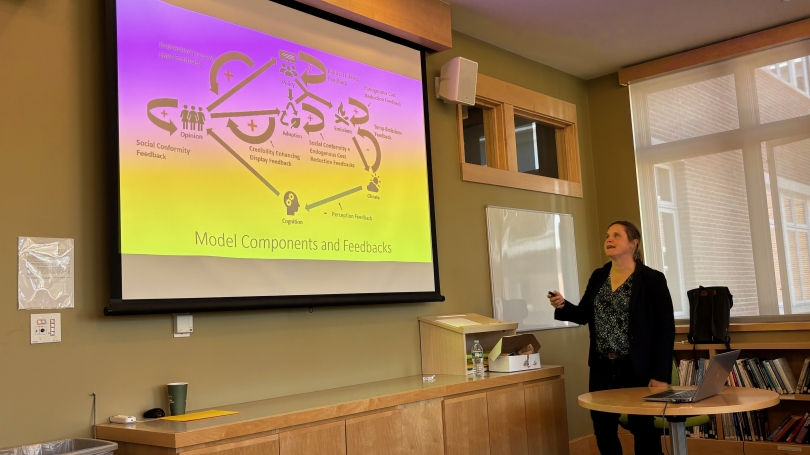
- Undergraduate
- Research
- About the Program
- News & Events
- People
Back to Top Nav
Back to Top Nav
Back to Top Nav
Back to Top Nav
The Program in Quantitative Social Science co-hosted with the Department of Geography a talk with Associate Professor Fran Moore from UC Davis on May 1, 2025. Professor Moore is an Associate Professor, Hurlston Presidential Chair, and Chancellor's Fellow in the Department of Environmental Science and Policy at the University of California Davis. Her work spans the intersection of climate change science and environmental economics, using a combination of econometric inference, statistical analysis, and structural modeling to address questions related to the quantification of climate damages, adaptive responses to climate change, the design of adaptation policy, and the behavior of the coupled climate-social system. The title of Professor Moore's talk was, "Determinants of Emissions Pathways in the Coupled Climate Social System."
Abstract: The ambition and effectiveness of climate policies will be essential in determining greenhouse gas emissions and, as a consequence, the scale of climate change impacts. However, the socio-politico-technical processes that will determine climate policy and emissions trajectories are treated as exogenous in almost all climate change modelling. Here we identify relevant feedback processes documented across a range of disciplines and connect them in a stylized model of the climate–social system. An analysis of model behavior reveals the potential for nonlinearities and tipping points that are particularly associated with connections across the individual, community, national and global scales represented. These connections can be decisive for determining policy and emissions outcomes. After partly constraining the model parameter space using observations, we simulate 100,000 possible future policy and emissions trajectories. These fall into 5 clusters with warming in 2100 ranging between 1.8 °C and 3.6 °C above the 1880–1910 average. Public perceptions of climate change, the future cost and effectiveness of mitigation technologies, and the responsiveness of political institutions emerge as important in explaining variation in emissions pathways and therefore the constraints on warming over the twenty-first century.